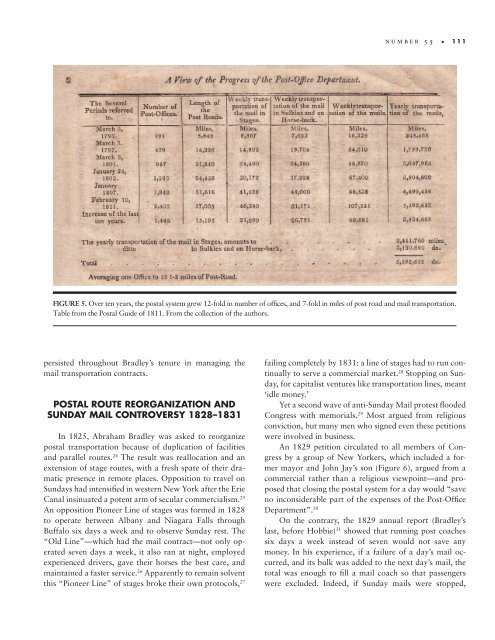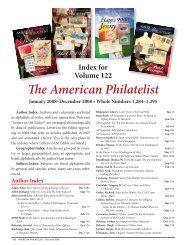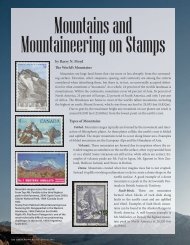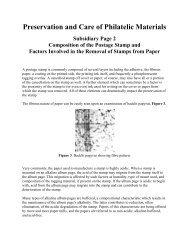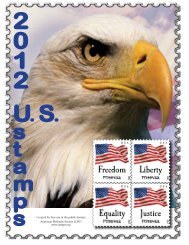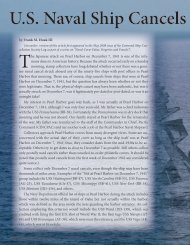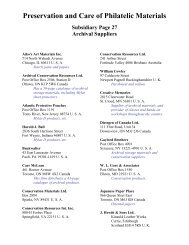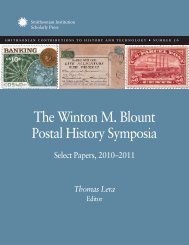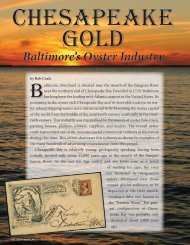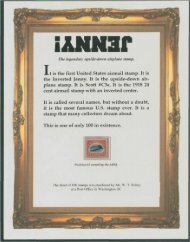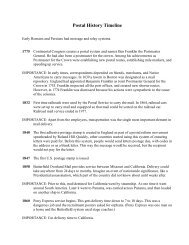The Winton M. Blount Postal History Symposia - Smithsonian ...
The Winton M. Blount Postal History Symposia - Smithsonian ...
The Winton M. Blount Postal History Symposia - Smithsonian ...
- No tags were found...
You also want an ePaper? Increase the reach of your titles
YUMPU automatically turns print PDFs into web optimized ePapers that Google loves.
n u m b e r 5 5 • 1 1 1Figure 5. Over ten years, the postal system grew 12- fold in number of offices, and 7- fold in miles of post road and mail transportation.Table from the <strong>Postal</strong> Guide of 1811. From the collection of the authors.persisted throughout Bradley’s tenure in managing themail transportation contracts.<strong>Postal</strong> Route Reorganization andSunday Mail Controversy 1828–1831In 1825, Abraham Bradley was asked to reorganizepostal transportation because of duplication of facilitiesand parallel routes. 24 <strong>The</strong> result was reallocation and anextension of stage routes, with a fresh spate of their dramaticpresence in remote places. Opposition to travel onSundays had intensified in western New York after the ErieCanal insinuated a potent arm of secular commercialism. 25An opposition Pioneer Line of stages was formed in 1828to operate between Albany and Niagara Falls throughBuffalo six days a week and to observe Sunday rest. <strong>The</strong>“Old Line”—which had the mail contract—not only operatedseven days a week, it also ran at night, employedexperienced drivers, gave their horses the best care, andmaintained a faster service. 26 Apparently to remain solventthis “Pioneer Line” of stages broke their own protocols, 27failing completely by 1831: a line of stages had to run continuallyto serve a commercial market. 28 Stopping on Sunday,for capitalist ventures like transportation lines, meant‘idle money.’Yet a second wave of anti- Sunday Mail protest floodedCongress with memorials. 29 Most argued from religiousconviction, but many men who signed even these petitionswere involved in business.An 1829 petition circulated to all members of Congressby a group of New Yorkers, which included a formermayor and John Jay’s son (Figure 6), argued from acommercial rather than a religious viewpoint—and proposedthat closing the postal system for a day would “saveno inconsiderable part of the expenses of the Post- officeDepartment”. 30On the contrary, the 1829 annual report (Bradley’slast, before Hobbie) 31 showed that running post coachessix days a week instead of seven would not save anymoney. In his experience, if a failure of a day’s mail occurred,and its bulk was added to the next day’s mail, thetotal was enough to fill a mail coach so that passengerswere excluded. Indeed, if Sunday mails were stopped,


